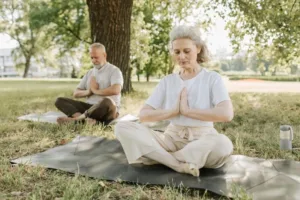The Journey Of Dealing With Negative Thoughts
There is a distinction between what happens to us, how we think about what happens to us, and how we behave as a result. We then need to see whether our thinking and behavior are either making things more difficult for us, or if they are actually helping us.
Meditation assists us in looking for something that is present outside of our consciousness. In a sense, it broadens our awareness to welcome new thinking and new actions that don’t always seem clear at the beginning, but which can be life-changing once mastered.

Our Thoughts
Our brain is constantly active. Some of the thoughts of our brain are positive, while some others are negative. Our thoughts often come to us without any intervention from our end. They simply seem to be there and remain there, even when they are causing us considerable distress. Often, we wish they would release their hold on us.
Our typical response when it comes to negative thoughts is that we cannot eliminate our negative thinking no matter how hard we try. We don’t just see them as negative thoughts, but as realities and truths. It may even lead you to think that there is nothing you can do to make yourself feel better.
Our thoughts have a significant impact on the way we feel and what we are capable of doing. Negative thoughts such as ‘I feel terrible’ or ‘I cannot do this’ can increase your anxiety and unhappiness. While some of your thoughts may be based on realities, a lot of them are not – they are merely guesses and assumptions of what might or might not happen to us in life. It is as if you have a radio in your head that you cannot turn off. These negative thoughts persist when you try to block them.
Try It For Yourself
Picture a pink flamingo in your mind. It is an elegant bird that probably fills your head with a nice picture. Now, tell yourself that if you can spend 1 minute without thinking of a pink flamingo, something wonderful will happen.
Get ready.
So, what happened?
You probably tried hard to keep any thoughts of flamingos out of your mind. However, this likely proved to be very challenging. This is because what we resist, persists.

Every thought or belief that hinders you from achieving your goals is negative.
One of the difficulties with recognizing negative thoughts is that they are good at appearing as rational truths. As a result, we seldom challenge them and simply go along with their mental chatter. In addition, when someone asks what is going on in our mind that is causing us to feel unhappy or anxious, we often respond along the lines of ‘I’m not thinking anything significant’.
A reason for this can be that our emotions have taken over and we feel overwhelmed by feelings like anxiety, panic, and depression. Plus, these emotions may also be accompanied by physical symptoms like stomach or headaches, tiredness, and general tension.
Awareness Is The First Step
We rarely give much consideration to our thoughts and beliefs, even when they are activated. Realizing the power of long-held beliefs over present thinking patterns is very important in awakening ourselves to a more realistic and optimistic way of looking at life.

To start reducing the impact that negative thoughts have on us, we first need to become aware of these thoughts. In turn, we can try to understand why these thoughts are negative. Check in with your thoughts periodically as you go about your day. Is your thinking positive and constructive right now, or is it just endless rumination that serves no real purpose? Practice this “pause & reflect” regularly.
Regulating your emotions means you can manage your emotions to be appropriate to a scenario, rather than being inappropriate. It simply means being able to correctly pinpoint your emotions and evaluate their appropriateness to the circumstance. Keeping your emotions in check can help to prevent feeling regrets that you did not manage a situation as you would have liked.
Becoming More Mindful Through Meditation

Meditation helps to enhance your emotional intelligence. Through meditation, you will begin to examine our approach to life events, and you may notice there is a negative pattern you were previously unaware of.
Meditation also helps to become more mindful. Mindfulness helps you to become calmly aware of the present moment in a thoughtful and non-judgmental way. It also helps to deal with managing our cognitive bias – which is that the way we look at something depends on our mood. We are often so focused on this negative thinking bias that we forget to be aware of the present moment, of what is around us – such as the coffee we have just drunk or the tree we have just passed.
Bringing yourself into the consciousness of your surroundings, both visually and through listening, will reduce your negative thinking and concentrate your attention on the serenity of the present moment. That is also the primary goal of meditation itself.
Mindfulness isn’t a problem-solving technique. It truly is just a way of being. It will enhance your awareness, help you relax, create a calmer mind, and reduce pain. In the being-state, you will be courageous enough to truthfully look at our thoughts. That which we resist persists, so we cannot block our thoughts, but we can learn to stand back and observe them without being overwhelmed by them. It allows us to evaluate them better. It will give you chances to appreciate them for what they are: just thoughts, not truths.
Samavira Meditation
Samavira is a global meditation community full of like-minded meditators that welcomes everyone interested in meditation. Samavira has beginner-friendly resources along with in-depth training that helps you design your own meditation style. Get started by signing up on our website today! You can also follow us on Instagram @samavira.meditation for daily inspiration.
Enjoyed this article? Share it!
Keep reading!

Sleep Better, Live Better: Meditation for Insomnia Relief
Insomnia affects millions of people worldwide, leading to various health issues such as fatigue, irritability, and a weakened immune system. One effective method to combat

Clarity Amidst Chaos: How to Use Meditation for Concentration and Focus
Let’s talk about why meditation for concentration and focus is important. Focus is a crucial aspect of daily life that allows individuals to concentrate their

Meditation for Emotional Resilience: A How-to Guide
Meditation is a powerful tool that can help build emotional resilience. In our daily lives, we encounter various stressors and challenges that can impact our

Using Meditation to Cope with Flashbacks and Emotional Triggers
Experiencing flashbacks and emotional triggers can be an overwhelming challenge, often leading individuals to seek various coping strategies. Among these, meditation has emerged as a

Meditation for Seniors: Practical Tips for Healthy Aging & Wellbeing
You may be wondering, why meditation for seniors? The truth is, no one is too old or too young to meditate. Meditation is for everyone,

How To Become A Meditation Teacher: 9 Practical Steps To A Blissful Career
Being a meditation teacher is a beautiful path to personal growth, career satisfaction, and creating a positive impact in your community. If you have ever

